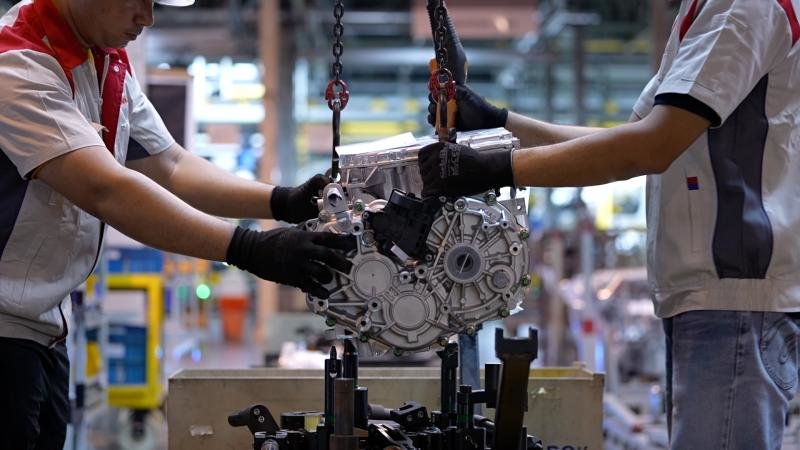Thailand's Electric Vehicle Market Set for 40% Sales Surge in 2025
Local production, Chinese investment, and government incentives are driving the electric vehicle market's growth, despite concerns over a price war.
Thailand's electric vehicle (EV) market is set to experience a 40% increase in sales in 2025, surpassing 100,000 units, according to Suroj Sangsnit, president of the Electric Vehicle Association of Thailand (EVAT).
This surge follows a national incentive program that requires local production of 1.5 vehicles for each imported unit between 2022 and 2023, offering tax breaks and subsidies of up to 150,000 baht (approximately 4,400 USD).
As a result, Thailand has become Southeast Asia's largest EV market, with 70,000 new EVs sold in 2024 and 84,000 units imported between 2022 and 2023.However, analysts warn that the increase in local EV production, driven largely by Chinese carmakers such as BYD, Great Wall Motor, and GAC AION, could fuel a prolonged price war in a market already facing sluggish demand.
In January, Great Wall Motor slashed prices of its Ora Good Cat by up to 270,000 baht, and GAC AION reduced prices of its AION Y Plus by 166,000 baht.
Siam Commercial Bank's senior analyst Tita Phekanonth forecasts a widespread, aggressive price war, potentially extending to internal combustion engine vehicles.Thailand's auto industry has been struggling with a sharp decline in sales, both domestically and internationally.
In December 2024, local vehicle production fell for the 17th consecutive month, with vehicle exports dropping by 8.8%, and domestic sales plummeting by 26%, the lowest level in 15 years.
The situation has led to concerns over oversupply, especially as Chinese carmakers continue to ramp up investments in Thailand's EV production.
More than 102.7 billion baht (3 billion USD) has been invested by Chinese firms such as BYD and Great Wall Motor.In response, Thailand's Board of Investment (BOI) has adjusted rules, including extending timelines for battery production and offering incentives for hybrid vehicles.
The BOI is also exploring potential EV exports, which could help mitigate oversupply.
Despite these measures, the local production requirement for EVs to qualify for subsidies has led to heightened competition.
Carmakers who fail to meet the requirements may face penalties of up to 400,000 baht (approximately 11,806 USD) per vehicle.The Thai government has set ambitious targets for the EV market, aiming to convert 30% of its annual auto production to electric vehicles by 2030. As Thailand attracts increased Chinese investment, the country's position as a major EV production hub in Southeast Asia continues to solidify, even as challenges such as price wars and market oversupply remain significant concerns for the industry.
This surge follows a national incentive program that requires local production of 1.5 vehicles for each imported unit between 2022 and 2023, offering tax breaks and subsidies of up to 150,000 baht (approximately 4,400 USD).
As a result, Thailand has become Southeast Asia's largest EV market, with 70,000 new EVs sold in 2024 and 84,000 units imported between 2022 and 2023.However, analysts warn that the increase in local EV production, driven largely by Chinese carmakers such as BYD, Great Wall Motor, and GAC AION, could fuel a prolonged price war in a market already facing sluggish demand.
In January, Great Wall Motor slashed prices of its Ora Good Cat by up to 270,000 baht, and GAC AION reduced prices of its AION Y Plus by 166,000 baht.
Siam Commercial Bank's senior analyst Tita Phekanonth forecasts a widespread, aggressive price war, potentially extending to internal combustion engine vehicles.Thailand's auto industry has been struggling with a sharp decline in sales, both domestically and internationally.
In December 2024, local vehicle production fell for the 17th consecutive month, with vehicle exports dropping by 8.8%, and domestic sales plummeting by 26%, the lowest level in 15 years.
The situation has led to concerns over oversupply, especially as Chinese carmakers continue to ramp up investments in Thailand's EV production.
More than 102.7 billion baht (3 billion USD) has been invested by Chinese firms such as BYD and Great Wall Motor.In response, Thailand's Board of Investment (BOI) has adjusted rules, including extending timelines for battery production and offering incentives for hybrid vehicles.
The BOI is also exploring potential EV exports, which could help mitigate oversupply.
Despite these measures, the local production requirement for EVs to qualify for subsidies has led to heightened competition.
Carmakers who fail to meet the requirements may face penalties of up to 400,000 baht (approximately 11,806 USD) per vehicle.The Thai government has set ambitious targets for the EV market, aiming to convert 30% of its annual auto production to electric vehicles by 2030. As Thailand attracts increased Chinese investment, the country's position as a major EV production hub in Southeast Asia continues to solidify, even as challenges such as price wars and market oversupply remain significant concerns for the industry.














